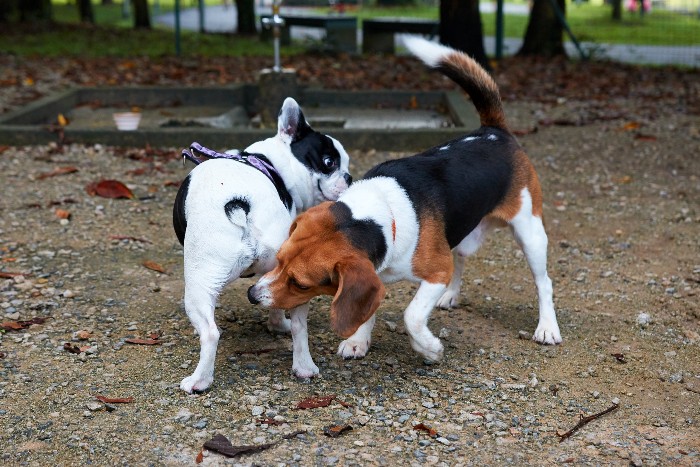
DogFoodAdvisor is reader supported See how
Dog Food Advisor is 100% impartial and is never paid to promote any brand. But if you buy using links on this page, we may earn a referral fee.
Dogs dragging bottoms along the ground and sniffing other dogs’ behinds may seem peculiar traits to pet parents (although our dogs might think the same about some of our characteristics), but these strange habits are often related to dogs’ anal glands.
Although not the most appealing topic, dog anal glands and impacted anal glands are one of the most common concerns for dog parents.
But what exactly are your dog’s anal glands and does their diet have an impact on blockages? This article is here to help guide pet parents through common issues and concerns about blocked anal glands and diet advice for prevention.
What are my dog’s anal glands?
Your dog’s anal glands are two tiny sacs located on either side of the anus. Normally, a dog will express their glands naturally when they poop or in some cases, they will involuntarily express their glands when they are stressed or scared.
Expressing their own anal glands allows a dog to leave their (usually stinky) scent behind to claim their territory — often near their home to make sure neighboring dogs know their place. It’s why your dog sniffs another butt when out and about — they gather information about the other dog’s hormonal status and health. It’s actually pretty cool. 1
How do I know if my dog has blocked anal glands?
A healthy dog can go a lifetime without any major issues and they will continue to naturally express their glands without assistance.
When anal glands do not get naturally expressed, they can become swollen and blocked which can then cause infections or abscesses due to the build-up of material. This is called anal succulitis or anal gland impaction.
In this case, your dog could require their anal glands to be manually expressed. You can usually tell if they are blocked by the following symptoms:
- Scooting
- Frequently turning to lick or bite their bottom
- Straining to poop
- Showing discomfort when pooping
- Not wanting to sit
- Anal discharge
- Whimpering
What should I do if my dog has blocked anal glands?
If these symptoms persist, it’s best to visit the vet as soon as possible because blockages can lead to gland infections and abscesses. Your dog may then need manual expression every few weeks to ensure it doesn’t consistently happen.
Why do dogs get impacted anal glands?
There can be many underlying reasons why your dog’s anal glands become impacted and here are some common causes:
- Chronic diarrhea and constipation
- Chronic skin conditions and allergies
- Gastrointestinal disease and dysbiosis
- Obesity
- Anatomical malformation
- Breed/size
- Diet
Blocked anal glands can stem from a combination of reasons and it’s important to get to the bottom of the cause to avoid the issue happening in the future.
Can diet cause anal gland problems?
“Anal gland problems can be indirectly caused by diet. For instance, weight and digestive health are contributing factors for anal gland issues,” says Laura Ward, DFA’s nutritionist.
“Overweight dogs are more likely to suffer from anal gland problems due to fat deposits and weaker muscles around their bottom. Keeping your dog slim, and at a healthy weight, helps to avoid anal gland problems.”
While the diet itself doesn’t directly cause anal gland issues, dogs prone to diarrhea or constipation may face challenges with proper anal gland emptying. In such cases, there’s reduced pressure on the anal sacs for natural expression.
If your dog’s current diet isn’t ideal for their digestion, making adjustments such as opting for a more suitable diet or incorporating higher fiber levels can help prevent anal gland problems.
Dietary Fiber
Increasing the fiber your pet consumes causes the stools to be larger, allowing for more pressure on the anal glands to ensure that they can be expressed naturally.
Normally, a well-balanced dog food will contain a high fiber content, but you can opt for a particularly high-fiber food if you feel your dog requires a little more.
Because fiber is only found in the wall of a cell (and since animal cells don’t have cell walls) fiber can only come from vegetables and grains, not from meat.
The fiber increase may have the added benefit of reducing the weight of dogs who are obese, helping them to feel full faster and for a longer period.
Fats
Omega 3 fatty acids are anti-inflammatory and can help relieve the pain and swelling associated with inflamed anal sacs.
Fish oils that are rich in omega 3’s, can help lubricate the stool and protect the sensitive structures inside the rectum from damage from hard stools and may help prevent constipation.
If you feel your dog’s food isn’t providing enough, you could add a veterinary fish oil supplement or choose a high-fiber diet that contains a fish oil source. It’s best to discuss with your vet on added supplements just to ensure it’s safe to take with their regular diet.2
Anti-inflammatory food
A diet that’s rich in powerful anti-inflammatory ingredients like omega essential fatty acids, ginger, spirulina, and turmeric can alleviate the swelling and prevent inflammation from occurring in the first place.
You may consider adding a supplement if you feel necessary, but again, your vet will be happy to discuss options and advise on the best one for your particular dog.
Clean water
Dehydration affects the efficiency of a dog’s digestive system and can often lead to constipation. If your dog suffers from anal gland problems, straining to pass a hard poo can make matters worse.
Give your dog access to plenty of fresh water to keep them hydrated or encourage them to drink more by using a water fountain.
There are of course many reasons for issues with anal glands. It’s important to keep your dog at a healthy weight by regular exercise and a well-balanced diet to minimize the chances of blocked anal glands.
Although anal gland issues can be improved with diet, it is not the sole cause and if your pet continues to have severe impactions, infections, and abscesses, it may be necessary to discuss surgical options with your vet.
Final word
The Dog Food Advisor does not accept money, gifts, samples or other incentives in exchange for special consideration in preparing our reviews.
However, we do receive a referral fee from online retailers (like Chewy or Amazon) and from sellers of perishable pet food when readers click over to their websites from ours. This helps cover the cost of operation of our free blog. Thanks for your support.
For more information, please visit our Disclaimer and Disclosure page.
Article reviewed by
Laura Ward
Pet Nutritionist
Laura studied BSc (Hons) Animal Science with an accreditation in Nutrition at the University of Nottingham, before working for eight years in the pet food and nutrition industry.




